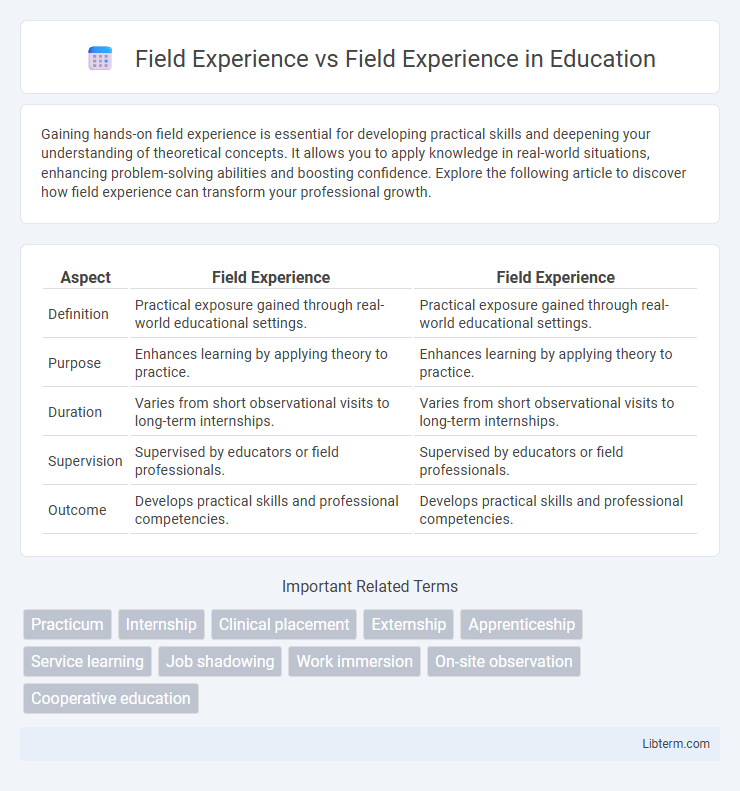Gaining hands-on field experience is essential for developing practical skills and deepening your understanding of theoretical concepts. It allows you to apply knowledge in real-world situations, enhancing problem-solving abilities and boosting confidence. Explore the following article to discover how field experience can transform your professional growth.
Table of Comparison
| Aspect | Field Experience | Field Experience |
|---|---|---|
| Definition | Practical exposure gained through real-world educational settings. | Practical exposure gained through real-world educational settings. |
| Purpose | Enhances learning by applying theory to practice. | Enhances learning by applying theory to practice. |
| Duration | Varies from short observational visits to long-term internships. | Varies from short observational visits to long-term internships. |
| Supervision | Supervised by educators or field professionals. | Supervised by educators or field professionals. |
| Outcome | Develops practical skills and professional competencies. | Develops practical skills and professional competencies. |
Understanding the Concept of Field Experience
Field Experience refers to practical, hands-on learning conducted outside traditional classroom settings, allowing students or professionals to apply theoretical knowledge in real-world environments. Understanding the concept of Field Experience involves recognizing its role in skill development, critical thinking, and professional growth through direct engagement with industry-specific tasks. Effective Field Experience bridges academic learning and practical application, enhancing competence and confidence in relevant fields.
Traditional Field Experience: Definitions and Importance
Traditional field experience involves hands-on learning in real-world settings, allowing students to apply theoretical knowledge in practical situations. This form of experiential learning is critical for developing essential skills such as problem-solving, communication, and professional etiquette. It bridges the gap between academic concepts and industry demands, enhancing employability and career readiness.
Modern Approaches to Field Experience
Modern approaches to field experience emphasize immersive, technology-enhanced learning environments that bridge theoretical knowledge with practical application. Virtual reality simulations and mobile data collection tools enable real-time feedback and skill refinement, increasing the effectiveness of hands-on training across various disciplines. Integrating interdisciplinary collaboration and reflective practices ensures that field experience aligns with evolving industry standards and prepares learners for complex, dynamic work settings.
Key Differences Between Field Experience Types
Field experience in education typically refers to supervised practical training in a real-world setting, such as student teaching or internships, allowing learners to apply theoretical knowledge. In contrast, field experience in research involves data collection and observation in natural environments to gather empirical evidence and insights. The key differences lie in objectives--educational field experience emphasizes skill development and pedagogy, while research field experience prioritizes systematic data acquisition and analysis.
Benefits of Hands-On Field Experience
Hands-on field experience enhances practical skills by immersing individuals in real-world environments, fostering problem-solving capabilities and adaptability. It bridges the gap between theoretical knowledge and actual application, boosting confidence and competence in professional settings. Employers highly value candidates with extensive field experience due to their proven ability to handle workplace challenges effectively.
Challenges Faced During Field Experience
Challenges faced during field experience often include adapting to unpredictable environments, managing limited resources, and overcoming communication barriers with diverse stakeholders. Field experience requires practical problem-solving skills to address real-time issues such as equipment malfunctions or client resistance. Navigating workplace dynamics and maintaining safety protocols also present significant challenges that test the resilience and adaptability of professionals in the field.
Integration of Technology in Field Experience Programs
Field experience programs integrate technology to enhance real-world learning by using digital tools such as mobile apps, virtual simulations, and data collection software. These technological advancements facilitate remote supervision, streamline data analysis, and improve communication between mentors and participants. By embedding technology, field experience programs increase accessibility, engagement, and the practical application of skills in diverse environmental and professional settings.
Measuring the Impact of Diverse Field Experiences
Measuring the impact of diverse field experiences involves evaluating how various real-world environments enhance skill acquisition, critical thinking, and cultural competence among participants. Quantitative data such as student performance metrics and qualitative feedback like reflective journals provide insights into the effectiveness of distinct field experiences across disciplines. Research consistently shows that exposure to diverse field settings fosters adaptability and problem-solving abilities, crucial for professional growth in fields like education, healthcare, and environmental science.
Best Practices for Maximizing Field Experience Outcomes
Maximizing field experience outcomes requires deliberate planning, clear learning objectives, and structured reflection processes to ensure practical skills are effectively developed. Best practices include integrating real-world problems, fostering mentorship opportunities, and utilizing feedback loops that connect theoretical knowledge with hands-on application. Systematic assessment methods and adaptable learning environments further enhance the depth and retention of field experience in diverse professional contexts.
The Future of Field Experience in Education and Industry
Field experience in education serves as a critical platform for students to apply theoretical knowledge in real-world settings, enhancing practical skills and professional readiness. In industry, field experience accelerates workforce competence by fostering hands-on learning, problem-solving abilities, and adaptability to dynamic environments. Emerging trends emphasize integrating digital tools and immersive technologies to expand access and effectiveness of field experience, shaping the future of experiential learning across sectors.
Field Experience Infographic

 libterm.com
libterm.com